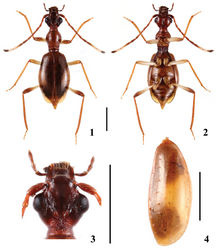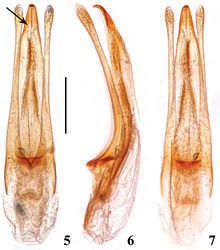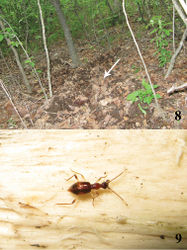Brathinus satoi
| Notice: | This page is derived from the original publication listed below, whose author(s) should always be credited. Further contributors may edit and improve the content of this page and, consequently, need to be credited as well (see page history). Any assessment of factual correctness requires a careful review of the original article as well as of subsequent contributions.
If you are uncertain whether your planned contribution is correct or not, we suggest that you use the associated discussion page instead of editing the page directly. This page should be cited as follows (rationale):
Citation formats to copy and paste
BibTeX: @article{Tang2013ZooKeys344, RIS/ Endnote: TY - JOUR Wikipedia/ Citizendium: <ref name="Tang2013ZooKeys344">{{Citation See also the citation download page at the journal. |
Ordo: Coleoptera
Familia: Staphylinidae
Genus: Brathinus
Name
Brathinus satoi Kishimoto & Shimada, 2003 – Wikispecies link – Pensoft Profile
Material examined
China: Zhejiang: 1♀, Longwangshan, 1200m, 25.IV.2004, Jia-Yao Hu leg.; 1♂, Longwangshan, Qianmutian, 1300m, 24.V.2009, Feng & Yin leg.; 11♂♂ 5♀♀, same locality, 1250m–1450m, 30°23'N, 119°26'E, 14.V.2013, Yu, Li, Zheng, Chen, Pan, Hu & Tang leg.; 1♂, same locality, 1050–1200m, near 30°24'28"N, 119°26'25"E, 15.V.2013, Chen & Pan leg.
Distribution
China (Sichuan, Zhejiang).
Comments
This species can be easily recognized by rugose punctation along supraorbital furrows (Fig. 3) and several additional characters: antennae reddish brown with antennomeres 9 and 10 pale and antennomere 11 blackish; each elytron (Fig. 4) with a large yellowish mark extending from the elytral center to a broad yellowish band along the lateral margin, anterad and posterad from the midpoint; profemur and metafemur with approximately half of the apical portion darker, mesofemur with apical portion slightly darker (Figs 1, 2); median lobe of aedeagus with a sclerotized apical portion which is delimited basally by a curved margin (Figs 5–7). In immature specimens, however, the elytral coloration is hardly discernible.
Biological notes
Most specimens were collected by sifting leaf litter along a stream in the forest, sometimes even along the bed of temporary brooks (Fig. 8). Two individuals were observed actively moving on the underside of a wet log lying close to a tiny stream (Fig. 9). In the past ten years, many collecting trips were made to Longwanshan from the middle of April to the beginning of October, covering all altitudes of the area in each trip (300–1500m), and the collections show that the activity period of the adults is during late April through May at the higher altitudes of the area, above 1000m.
Taxon Treatment
- Tang, L; Li, L; 2013: Range extension of Brathinus satoi in China (Coleoptera, Staphylinidae) ZooKeys, 344: 49-54. doi
Images
|


